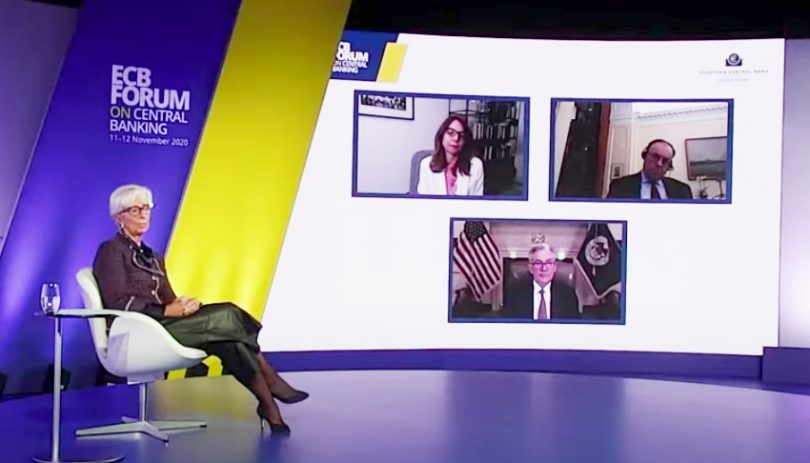The topic of central bank digital currencies (CBDC) came up at yesterday’s European Central Bank Forum. Christine Legarde, President of the European Central Bank (ECB), said she had a hunch that there would be a digital Euro, but it was subject to a collective decision. If there’s a positive decision next year, it will take 2-4 years to implement. Meanwhile, U.S. Federal Reserve Chair Jerome Powell noted that if a CBDC were to happen, it should not preempt the use of cash or private digital currencies. However, this may have been a slip of the tongue as he then referred to FedNow.
“The main focus is on whether and how a CBDC could improve what is already a safe, effective and dynamic domestic payments system,” said Powell and then referred to the still-strong demand for cash in the United States. “We would need this to be done in a way that does not preempt the use of cash or the use of other private digital currencies or non central bank digital currencies such as the FedNow payment service.”
Lagarde was rather bullish about a digital euro. “We’re not racing to be first. And we believe that a digital Euro will not be a substitute for cash. It will be a complement to cash,” she said.
“If it is cheaper, faster, more secure for the users, then we should explore it. If it is going to contribute to a better monetary sovereignty, a better autonomy for the Euro area, I think we should explore it. If it is going to facilitate cross border payments, which are very laborious in quite a few corners of our big world, then we should explore it. So that’s the reason why we have launched a consultation in mid-October that will be completed in mid-January. And at that point in time, we will make a decision as to whether or not we will go forward with a digital Euro.”
In the recent CBDC paper from the ECB the decision timeline was set as mid-2021.
Lagarde continued: “My hunch, but this is a decision that will be taken collectively, is that we might well go in that direction, which does mean that a digital Euro is going to be available right away. Because obviously, we are going to have to address all the issues of anti money laundering, financing of terrorism, privacy of users and all their information, the appropriate technology that will carry that digital currency. And this is a project that will probably take us two, three, four years before it is launched.”
“Just to give you an indication, the PBoC, which is the central bank of China has started exploring this about five years ago. In the same way that Facebook, which is exploring a private stablecoin, has started exploring about four years ago and Libra is certainly well advanced. But it’s also a good reason for all of us to be very attentive to the way in which monetary policy can be secured and monetary transmission can be safeguarded. Those are the reasons why we are moving ahead diligently and not incautiously. So we will be prudent. We know that it will not replace cash, but my hunch is that it will come.”
Asked if the main driver is autonomy, Lagarde responded that the purpose would be to respond to customers’ demands in Europe. But she pointed to the declining use of cash in some areas such as Sweden and the Netherlands.
Bank of England Governor Andrew Bailey spoke about stablecoins. “For me, a critical public policy issue is people have a right to expect certainty of value in the instrument they use to make payments,” he said. As a result, in his view, private stablecoins have not met that bar. And hence he believes that only central bank digital currencies can provide that certainty of value. Given the declining international value of the pound in the last five years, that comment might raise a few eyebrows. Bailey’s primary concern is how CBDCs might affect monetary policy and financial stability.






